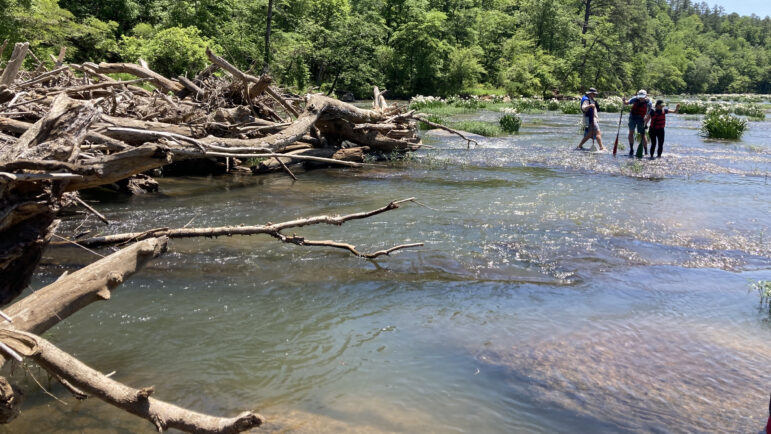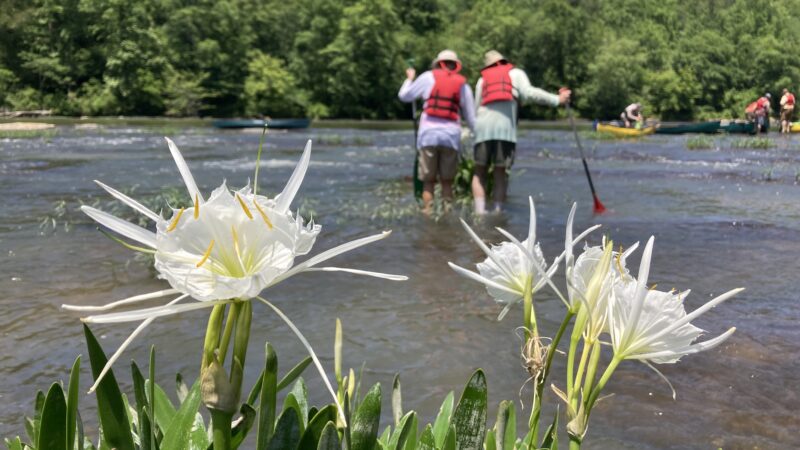Cahaba lily season draws crowds, inspires conservation efforts
This story is part of a monthly series called Outdoor Connections, which features stories that explore the biodiversity of Alabama and how we depend on it.
Lined up along the banks of the Cahaba River in Bibb County, about two dozen people buckle into life jackets and delicately climb into canoes.
“We are about to paddle down through the Cahaba River National Wildlife Refuge to go see the Cahaba lilies, a very, very cool flower that’s pretty geologically remote,” said Wil Rainer, trip leader and field programs director at the Cahaba River Society (CRS).
Cahaba lilies are big white flowers with spider-like petals that bloom for just one day a year, usually between mid-May and mid-June.
The species, which grows in the middle of moving water, is only found in three southern states, and Alabama is thought to be home to one of the largest Cahaba lily populations in the world.
Lily season draws spectators from across the state, hoping to catch a glimpse of the curious flower. For local environmental advocates, it’s a time to celebrate, but it’s also an opportunity to raise awareness of growing threats to the species.

Vulnerable habitat
After a roughly one-mile paddle downstream, the group arrives at Hargrove Shoals, where an expansive field of Cahaba lilies spans the width of the river.
Eager to see the flowers up close, paddlers park their canoes and carefully walk along the smooth rocks lining the shallow water.
Scientist Randy Haddock gathers the group around a clump of lilies in the middle of the river.
“These seem to like this kind of habitat,” Haddock said. “What they’re called is foliated rocks or flat rocks.”
Haddock, who has studied the Cahaba and its biodiversity for decades, said the lily bulbs like to wedge into the rocks along the riverbed and nest there.
It’s a dynamic and vulnerable habitat, evidenced by a menacing pile of dead trees and limbs floating near the flowers.

“Folks, what do you suppose is going to happen with the next high water event, when that thing floats away?” Haddock asked the group. “It’s a good chance it’s going to knock these down or knock ‘em loose.”
Haddock said that’s now a bigger threat than ever before due to activity upstream.
“What’s going on in Birmingham has a lot to do with what happens right here in this kind of special place,” Haddock said.
Erosion upriver
About 50 miles north of Hargrove Shoals, the banks of the Cahaba River look like they’ve been sliced with a knife.
“Sites like this are persistent sediment contributors to the Cahaba River,” said Ben Wegleitner, river sustainability director at CRS.
Over the years, water has eroded large sections of land in this area near Hoover, exposing roughly 20 feet of dirt along the curve.
It’s a persistent problem up and down the river.

These days, Wegleitner said water levels along the Cahaba appear to be more volatile than ever before, with the river rising and falling increasingly fast and to dangerous levels. The problem ties back to stormwater management.
When it rains, people like to quickly move water away and keep it off of roads and out of yards.
“But what that does is speeds up water getting to the Cahaba River, and we’re seeing the erosive effect that has,” Wegleitner said. “It brings trees into the rivers. Collapsing banks will often dislodge trees and send them down river.”
Down river, those trees can plow through clumps of Cahaba lilies, while loose sediment can fill in the precious space between rocks where lily seeds and many other creatures like to nest.
Inspiring change
Seeing the lilies up close, that information hits home for people on the canoe trip, like Sam Foley.
“I didn’t really realize that had a way downstream effect, and it does,” Foley said.
Foley said he’s glad to see more awareness of stormwater management issues and growing efforts to address the problem. More cities are supporting green development, leading to features like retention ponds that help slow runoff from draining into the Cahaba.
Foley said it’s a worthy investment to protect the river and the lilies.
“They’re beautiful,” he said.

For now, the Cahaba lily population appears to be stable, according to river expert Haddock. He said the lily is an incredibly resilient species that people rally around.
“It’s something that has just kind of become a symbol for the Cahaba, and it’s something that has inspired a lot of love and appreciation,” Haddock said.
Haddock credits local scientists who have studied the lilies for decades and discovered much about their habitat and how they grow. But he said at the end of the day, people are drawn to the flowers because they’re big and showy, and they’re a bit mysterious – white lilies growing in the middle of moving water, making an appearance just one day a year.
Learn more about the Cahaba lilies at the Cahaba Lily Festival, Saturday in West Blocton.
Do you have an idea worth featuring as part of our Outdoor Connections series? Email [email protected].
Forget the State of the Union. What’s the state of your quiz score?
What's the state of your union, quiz-wise? Find out!
A team of midlife cheerleaders in Ukraine refuses to let war defeat them
Ukrainian women in their 50s and 60s say they've embraced cheerleading as a way to cope with the extreme stress and anxiety of four years of Russia's full-scale invasion.
Nancy Guthrie case: How do families of missing people cope with the uncertainty?
When a loved one goes missing, relatives can feel guilty simply for eating, says Charlie Shunick, whose sister was kidnapped. Shunick now helps others navigate a nightmare "nobody is prepared for."
As the U.S. celebrates its 250th birthday, many Latinos question whether they belong
Many U.S.-born Latinos feel afraid and anxious amid the political rhetoric. Still, others wouldn't miss celebrating their country
US military used laser to take down Border Protection drone, lawmakers say
The U.S. military used a laser to shoot down a Customs and Border Protection drone, members of Congress said Thursday, and the Federal Aviation Administration responded by closing more airspace near El Paso, Texas.
Deadline looms as Anthropic rejects Pentagon demands it remove AI safeguards
The Defense Department has been feuding with Anthropic over military uses of its artificial intelligence tools. At stake are hundreds of millions of dollars in contracts and access to some of the most advanced AI on the planet.







